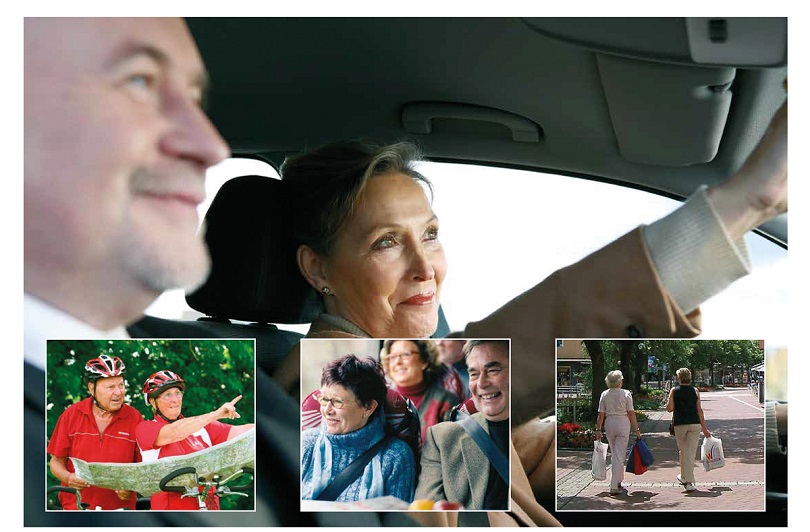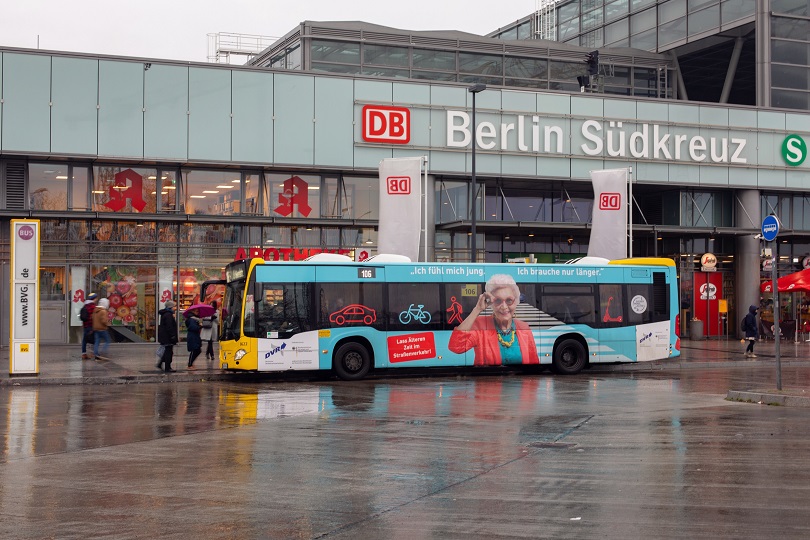
Source: Adobe Stock / moodboard
In 2023, more than half of the cyclists and pedestrians killed in accidents (59.3 percent) were at least 65 years old. Of all passenger car occupants killed in accidents, nearly one in three (33.2 percent) belonged to this age group. As unprotected road users, senior citizens are particularly at risk. The reasons are manifold. On the one hand, these numbers reflect the increased vulnerability of senior citizens. On the other hand, they are due to the fact that cognitive and motor skills change with age, and this requires an appropriate response. For this reason, it is important to raise awareness among senior citizens of possible risks and how to avoid them. However, younger road users are also called upon to act with care and anticipation towards the elderly. The Federal Ministry for Digital and Transport (BMDV) supports various actions and schemes.
“Staying mobile but safely!” adventure days on safer mobility in old age
Life is colourful. This is also the way the “Staying mobile but safe” road safety days organized by the German Accident Prevention Organization (DVW) present themselves. Be it accidents involving a turning vehicle or safe cycling, the use of pedelecs and the benefits of wearing a helmet, or a fatigue and intoxication goggles course, reaction, vision or hearing tests, the safe use of a rollator frame or visibility in road traffic - all these issues are addressed at the “Staying mobile but safely” events organized by the DVW. Participants can test their skills without obligation on a number of activity instruments such as a motor vehicle simulator.
The road safety days are offered in many different locations all over Germany: at village and town fairs, on senior citizens' days or at senior citizen community centres. They are offered free of charge and no prior registration is required. More information on “Staying mobile but safely” (in German).
“Safely mobile”: everyone in their own way

Source: Deutscher Verkehrssicherheitsrat e. V.
Whether elderly people are out and about by car, bike, pedelec, on foot or with a walking frame - preserving their safe mobility is the objective of the “safely mobile” courses offered by the German Road Safety Council (DVR). Every participant receives support in correctly assessing their capabilities and developing individual compensatory mechanisms. During these courses, senior citizens are exposed to hazardous road traffic situations that are typical of those they are likely to encounter at their age, address new rules and their personal physical and cognitive requirements. In the free of charge events, trained facilitators address individual concerns and interests of the participants and have practical advice ready at hand. More information on the “Safely mobile” programme (in German).
Safely mobile with the rollator
Being mobile means maintaining contacts, running errands and gaining new experiences - in short: participating in life independently and actively. However, mobility restrictions can occur with increasing age. Depending on the severity of the impairment, rollators can be a useful way of maintaining individual mobility. In order to be able to travel safely with the rollator in traffic and to avoid accidents as far as possible, some basic information should be taken into account. In this brochure of the DVR, which was created with the support of the Federal Ministry for Digital and Transport, there is a wide range of information on the correct selection of the rollator, the individual settings, the appropriate accessories and the safe use of the rollator in traffic. You can find more information in the brochure "Safely mobile with the rollator" (in German).
Safely mobile with wheelchairs and motorized hospital elevators
Participation in public life and thus in traffic is often difficult with restrictions on the musculoskeletal system. In addition to physical exertion, overcoming obstacles and especially covering longer distances are often not possible without the help of other people. Handicapped people and in some cases elderly, physically handicapped people are therefore often dependent on a wheelchair or an electric hospital elevator. They can be practical helpers when it comes to doing the shopping independently, visiting friends and family or attending a doctor's appointment. When switching to a wheelchair or a motorized hospital elevator, however, new challenges often arise for coping with everyday journeys. This DVR brochure, sponsored by the Ministry, provides information on the applicable road traffic regulations. It also includes numerous hints and tips with regard to settings and seating position and answers basic questions for safe use of the road with the wheelchair or the motorized hospital elevator. You can find more information in the brochure "Safely mobile with wheelchairs and motorized hospital elevators" (in German).
“Fit by bike”: The training programme for cyclists and pedelec riders.
Pedelecs, which are bicycles assisted by an electric motor that can reach a speed of up to 25 km/h, are very popular among senior citizens. Unfortunately, the share of fatal accidents involving a bike or a pedelec is particularly high. Bicycle training courses can help improve motor skills of senior citizens so they can better handle their bicycles or pedelecs. The one-day training course “Fit by bike” is carried out with qualified support by the DVW. The numerous exercises and practical tips for people riding bicycles or pedelecs are not only fun, but also enable participants to practice safe handling of their bike and in traffic. More information on the training programme for cyclists and pedelec riders (in German).
“I feel young. I just need longer”: Senior citizens campaign

Source: Deutscher Verkehrssicherheitsrat e. V.
“I feel young. I just need longer” and “I move with the times, but more slowly than you” are the humorous messages that can be seen on buses in major cities. The specific calls for action encourage everybody to ensure that the roads are safe for elderly persons. With this witty and tongue-in-cheek campaign, the DVR, together with the Ministry, wants to raise awareness among the younger generations that they should show particular consideration towards the elderly and take greater notice of them. More information on the “Safely mobile in old age” senior citizen campaign (in German).
Drivers of motor vehicles aged over 65
The “Safely mobile in old age” programme supported by the Ministry is aimed directly at the generation 65+. The project material addresses drivers of motor vehicles aged over 65 and the changes related to their age that may have an impact on their driving skills. The prevention campaign centres on “health checks” and “feedback rides” in old age.
The materials available also include a guide for the right way to address the issue of “driver fitness” with elderly family members as well as a
comprehensive brochure (in German) on the subject “Getting older and staying AUTOmobile”. More information about the campaign "feedback rides".